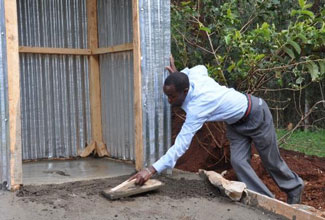Kenya - Latrine Options Expand Thanks to Artisan Training
When Zachary Njogu left high school in Nakuru County, his passion was teaching. But his aging parents could not afford the fees. Instead Njogu trained in hairdressing and opened a small barbershop.
Little did Njogu know that down the line, he would abandon the business and become a teacher, not of school children but the community. Njogu was selected to train as a community health volunteer. 
“They chose me because I know a lot about this area and they knew I would not let them down,” says 31-year-old Njogu. He took on his new role with gusto. With fellow volunteers, he traversed villages encouraging the community to adopt good hygiene practices.
“One of the biggest problems we face is open defecation,” says Njogu. “When people defecate in the open and when it rains, water washes away the waste. Since water is scarce, children end up drinking this water from pools left when the rains have gone.”
The lack of latrines spurred Njogu on a personal mission to encourage people to build latrines. He links up families to his friends who construct latrines.
Not surprisingly Njogu joined a group of artisans being trained to construct affordable and effective improved latrines as part of the WASHplus project in Kenya. The two-day practical training was organized when WASHplus realized that although households were willing and could afford to build latrines, few artisans had the skills to provide appropriate solutions.
“During field visits after we started a community-led total sanitation [CLTS] pilot project, we realized that local artisans lacked knowledge and skills to build affordable, improved latrines,” says Evelyn Makena, the WASHplus project manager who oversees a CLTS pilot project working with the Ministry of Health and the local community to make the area open defecation free. “Artisans are a critical link in the process. Well trained, they can create and meet demand for improved latrines built using materials families can afford.”
“The latrines they built were too deep, making them unnecessarily expensive,” says Makena. “And they dug rectangular pits, which led to latrines collapsing because of the loose topsoil,” she adds. “Digging circular pits that are not too deep save money that households can use to construct a concrete slab. This combination provides a family with more health benefits.”
Njogu and 17 other artisans and community volunteers attended the training along with government public officers. The first day was spent in a classroom where government instructors taught the basics of latrine construction such as siting the pit, getting the right dimensions for the pit, and costing out the materials needed for construction. On the second day, local health center trainers guided the participants in how to construct a model latrine.
After the training, Njogu and his team of three others—a mason and two pit diggers—began to market improved latrines in their area. Because he is well known and trusted in the community, Njogu easily convinces people to build latrines or improve those they already have.
Together with a mason, who is also a carpenter, they visit a client’s homestead and explain the various options. They then cost the latrine. Once a deal is struck and the client has bought the materials required, the pit diggers are summoned and work begins.
Within two weeks of the training Njogu’s team had built five improved latrines and orders were still coming. “We used to make toilets that were unstable because the foundation was weak,” says Njogu. “People like our new latrines because they are better. We make firmer slabs that are sloping, so they are easy to clean using very little water. We get many referrals when people inquire about the toilets we build.”
After the training, Njogu and his team started digging circular pits that are more stable. They also use a layer of bricks to stabilize the base and finish off with a smooth cast for easy cleaning.
The toilets are also affordable because fewer materials are wasted and people have more options—from those that use timber for the floor and walls to brick-and-mortar designs.
“Many families shared toilets because they were expensive to build,” says Njogu. “We always explain to the community that our latrines are better because we were trained.”
The efforts of volunteers like Njogu and others working with the WASHplus program are beginning to bear fruit. All but 21 of 1,400 households in the area have a latrine. The program is now working to ensure everyone uses the latrines all the time so that the area can be declared open defecation free.
See additional photos on the WASHplus Pinterest.

